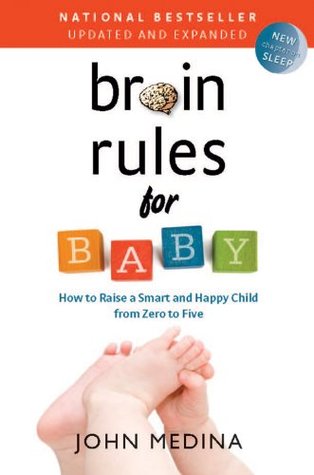More on this book
Community
Kindle Notes & Highlights
by
John Medina
Started reading
May 22, 2025
Babies can hear mom’s voice in the womb by the end of the second trimester,
They respond especially strongly after birth if mom’s voice is muffled, re-creating the sonic environment of the womb. Babies even respond to television shows their mothers watched while they were pregnant.
One funny test exposed preterm infants to the opening jingle of a particular soap opera. When these babies were born, they would stop cry...
This highlight has been truncated due to consecutive passage length restrictions.
Smell
after the sixth month of gestational life. Smells don’t have to be right under baby’s nose. Your baby can detect the perfume you wear and even the garlic you ate.
Don’t wash baby with soap and water immediately after she’s born. The smell of amniotic fluid calms her down, studies show. Why? As with sounds, smells remind babies of the comfortable home they were inhabiting for the past nine months.
place him on his back. Then gently lift up both of his legs, or both of his arms, and let them drop back to the bed of their own weight. His arms will usually fling out from the sides of his body, thumbs flexed, palms up, with a startled look on his face. This is called the Moro reflex.
The absence of a good solid Moro can be a sign of a neurological disorder. Infants need to be able to do it within five months of birth.
Taste
what you eat during the last stages of pregnancy can influence the food preferences of your baby.
This is called flavor programming, and you can do it soon after your baby is born, too.
Four things proven to help baby’s brain
weight • nutrition • stress • exercise
Gain just the right weight
Brain volume is related to birth weight,
The fuel of food helps grow a larger baby. Between four months and birth, the fetus becomes almost ridiculously sensitive to both the amount and the type of food you consume.
Babies experiencing a critical lack of nutriment have fewer neurons,
exhibit more behavioral problems, show slower language growth, have lower IQs, get worse grades,
you need to gain between 28 and 40 pounds to optimize your baby’s brain development. That’s about a pound a week in the critical last half of pregnancy. This is true for women of healthy weight,
The next balance comes between foods that a pregnant mom wants to eat and foods that are optimal for a baby’s brain development. Unfortunately, they are not always the same thing.
Eat just the right foods
An anxious person who is comforted by the chemicals in chocolate might grow to crave chocolate whenever she feels stressed—and a woman will feel stressed a lot during pregnancy. (This craving for chocolate reflects a learned response, not a biological need,
An infant’s body needs 45 different nutrients for healthy growth.
Iron is necessary for proper brain development and normal functioning even in adults,
no single diet is going to work the same way for all people, and that’s because of this extraordinary individuality. This is especially true if you’re pregnant.
Neurons need omega-3s
Those of us who don’t get enough omega-3s, studies show, are at much greater risk for dyslexia, attention-deficit disorders, depression, bipolar disorder, even schizophrenia.
One Harvard study looked at 135 infants and the eating habits of their mothers during pregnancy. The researchers determined that mothers who ate more fish starting in the second trimester had smarter babies than those who didn’t.
Avoid too much stress
The effects of that storm could be seen on the children’s brains years later.
Maternal stress can profoundly influence prenatal development.
especially if the woman is severely or chronically stressed in those hypersensitive last months of pregnancy.
Moderate stress in small amounts, the type most women feel in a typical pregnancy, actually appears to be good for infants.
others are stress sensitive.
Women under such a biological dictatorship need to keep stress to a minimum during pregnancy.
You can also begin identifying the areas in your life where you feel out of control, then deliberately form strategies that will allow you to take back control.
In some cases, that means exiting the situation that is causing the stress. A temporary helping of courage will translate to a lifetime of benefit for your baby’s brain.
At www.brainrules.net, we’ve listed a number of techniques known from the research literature to reduce stress.
Exercise just the right amount
Fit women have to push less
Studies show that if you are not in shape, it takes you twice as long to transit through the “pushing phase”
Aerobic exercise elevates a molecule in your brain that can specifically block the toxic effects of those nasty glucocorticoids.
which means better baby brain development.
Swimming is one of the best forms of exercise in later stages; the water helps transfer excess heat away from the womb.
Sustained exposure to hostility can erode a baby’s IQ and ability to handle stress, sometimes dramatically.
We know four of the most important sources of marital conflict in the transition to parenthood: sleep loss, social isolation, unequal workload, and depression.
Couples who make themselves aware of these can become vigilant about their behavior, and they tend to do better.
Andy Meltzoff stuck out his tongue at a baby 42 minutes old,
After some effort, the baby returned the favor,
Infants can discriminate human faces from nonhuman faces at birth and seem to prefer human ones.


